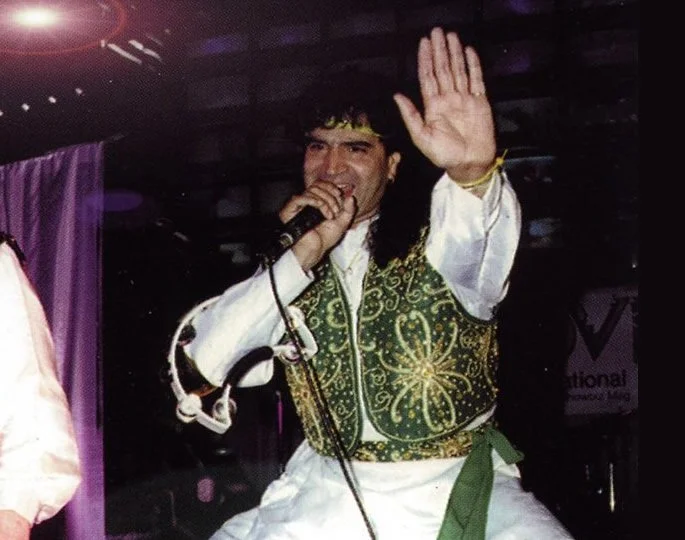Raf Saperra: A Potential Cultural Phenom?
Raf Saperra breathes new life into his Punjabi folk, early 2000s Bhangra and Hip Hop influences on his new mixtape 'Ruff Around the Edges'. It is an audacious and compelling body of work, which has the power to become a British Asian cult classic.
Raf Saperra breathes new life into his Punjabi folk, early 2000s Bhangra and Hip Hop influences on his new mixtape 'Ruff Around the Edges'. It is an audacious and compelling body of work, which has the power to become a British Asian cult classic.
I came across Raf Saperra at the back-end of 2020, when he released the self-directed music video for ‘G’lassy Riddim’. It was produced by Birmingham born and bred producer, G-Funk, who was one of my close friends at primary school. I’ve since fallen out of touch with him. I only really clicked on the video out of the intrigue, resulting from this loose connection and looking back it has proved to be one of my better decisions; I have been an avid Raf and G-Funk fan ever since.
I love my parents and am immensely grateful for all they’ve done for me over the years. Despite this I have at times struggled with being raised without much real exposure to Asian culture. I don’t know too much about my roots, I lack knowledge of the traditions and can’t speak the language - bar the swear words and insults, which are really fun to say. This has often led to the conundrum of essentially being ‘too brown for the white kids, but too white for the brown kids’.
Luckily I feel I’ve done a pretty good job of getting on with people and generally getting by. I haven’t really felt the need to change parts of my personality or even frantically revise Jazzy B lyrics the night before I’d go to a family function or wedding. However, when I first heard Raf Saperra I was hooked and I felt like I wanted to get involved with more Punjabi culture and learn the language and more about where I came from. These feelings have been compounded by his following releases and debut mixtape last week.
“His mixtape ‘Ruff Around the Edges’ is an ambitious project that showcases his versatility and dynamism as an artist.”
Saperra proves he is as comfortable lending his booming and engaging vocal range to hip hop inspired beats, see ‘Modern Mirza’ and ‘Saperra (Gang Jatt Di)’, as more traditional stripped back qawwali and boliyan numbers, see ‘Table Top Boliyan’ and ‘Mast Qalandar’. Saperra is a real student of Punjabi music and has essentially built a bridge from the era of folk singers such as Kuldeep Manak and Shaukat Ali Khan into the modern day. As a Hip Hop head, following Raf has allowed me to learn about this evolution in an accessible and entertaining format.
The accessibility of Raf’s material underlines his rare ability as a Punjabi artist to make music that pervades the boundaries of ethnicity. For example the track ‘Nach Le Soniye’, produced by The Culprit, is inspired by UK garage and has found its way being played on stages at the likes Glastonbury and Berghain via DJ Yung Singh. Singh is another artist at the forefront of the movement pushing British Punjabi culture into the mainstream. I’ve been fortunate enough to see him live, where he was extremely well received by diverse crowds. His success has been magnified by his recent Radio 1 residency, where he has showcased many of his musical influences from liquid jungle and house to traditional and contemporary Punjabi sounds.
Since coming into contact with this rapidly evolving British Punjabi scene, I have been motivated to learn more about my personal and family connections to Punjabi culture. For example, I've since found out that Amarjit Sidhu, someone I’ve played a casual game of 5-a-side with a couple of times, was a member of the legendary group Apna Sangeet. I listened through their back catalogue and quizzed my Dad about them. He didn’t exactly count himself as a huge fan, he too has had his challenges with embracing the Punjabi culture and language.
“However, he recalled having the Soho road legend Sardara Gill train with his old football team Mahal Warriors a few times, Gill also recorded their club anthem to the Match of the Day theme tune.
Given his aforementioned struggles with getting to grips with the language, during training my Dad confused Sardara’s name with the stage name of his group. Following him around the pitch shouting ‘Apna’ at him, wondering why he wasn’t receiving the ball back.”
Whatever it is, the way you tell your story online can make all the difference.
After becoming enamored with the new wave of cultural figures such as Raf and Yung Singh (and hopefully to reduce the likelihood of situations like the one above occurring to me), I am currently embarking on a journey to learn the Punjabi language and more about my roots. Raf’s music has had a massive impact on me and I’m looking forward to seeing how he evolves as an artist and person. He slickly combines genres, aspects from different cultures and elements from different eras into a unique sound with a huge personality. His mixtape is a rich tapestry of his influences and visions for his future sound. He has the potential to become the figurehead for a new generation of British Asian kids in the mainstream cultural spheres.
Written by Rohan Ram
Listen to ‘Ruff Around the Edges’ on Spotify
Overcoming the Instagram Algorithm: Claiming your Creative Space in the Online Metaverse
The social media revolution has completely transformed the music industry, creating a new environment defined by accessibility and speed - artists are only ever one post away from fame. So why do we often feel so out of control of our own content and careers?
Faced by alien algorithms and tough competition, our posts can easily get lost in endless Instagram and Facebook feeds. How do we create unique and wide-reaching content that captures attention, whilst remaining authentic?
Write The Future, hosted by PUNCH in collaboration with the WEST MIDLANDS MUSIC BOARD and META, equipped both aspiring and established artists with tools to navigate online spaces, including R&B stalwart PHELEBA, who ended the conference with a live performance. So what did we learn?
Here are our top three takeaways to overcome the algorithm:
1. Create Your Authentic Space
‘People buy from people. Know your essence’. Vanessa Bakewell, Meta
With everyone’s feeds flooded with infinite filtered versions of “reality”, can we risk posting content that truthfully represents our real and flawed selves? VANESSA BAKEWELL from Meta dismantled misconceptions that artists have to project a perfect image, instead emphasising the importance of establishing an individual and genuine brand - in sharing the highs and lows of their creative journeys, artists become personal and more accessible.
MALIK - musician and co-producer LEGACY - spoke on the importance of creating and controlling our own narratives. On making LEGACY, the history of Birmingham’s vibrant grime and hip-hop scene, Malik said:
‘It was our way of telling the story of Birmingham MC culture, keeping it fair and authentic’. - Malik
Malik also spoke on the role of social media as the record of your personal journey as an artist, providing a point of reference for others when social inequalities mean that minority communities’ narratives are unfairly represented in the media.
“We can use social media to create something greater than individual fame and success, but a communal record of Birmingham’s vibrant music scene.” -Ammo Talwar Punch CEO
2. The Power of Experimentation
“Use social media, utilise it & create short-form video.” Sade Omojowo, Meta
From Birmingham, SADE OMOJOWO recently helped Meta launch the Black Perspective’s Initiative, striving to support the next generation of creators from underprivileged backgrounds. Sade's main piece of advice was to keep varying and experimenting with content as well as directly communicating with your followers to learn what they want to see. This can be done using tools such as question stickers and polls. You can monitor engagement by utilising your account analytics. All of the expert speakers agreed that the most impactful form of content was short videos like Instagram reels.
“Use social media, utilise it & create short-form video.” Sade Omojowo, Meta
To create a ‘thumb-stopping’ video, it's important to establish your brand - your name, face and main content - in the first 3 seconds of the video. Although Sade encouraged creators to be consistent with posting, she stressed the idea of quality over quantity. Above everything else, all expert speakers encouraged artists to remain authentic and accessible to their followers.
“Everyone can hope to go viral if you hop on a trend but you need to give someone a reason to follow you. Be authentically you”. - Natalie Kelly, Meta
3. Brum Left Behind?
During the Q&A sessions, many audience members shared frustrations about the lack of permanent Birmingham based infrastructure and the ‘recycled conversations’ that prevent meaningful change. Even the expert speakers acknowledged that ‘talent can only go so far’ and without any Birmingham based media outlets, artists will struggle to sustain any attention that they get online. The most common solution voiced was to strive for better communication and collaboration between Birmingham creatives.
“Collaborate - Collaboration is huge. If people see that you’ve collaborated, your reach will snowball.” Sade, Meta
“The thing that Birmingham could do better is communication. Artists can only do so much, they need to connect with companies like Meta, Spotify, Punch Records etc – and likewise, companies should be connecting with the artists”. - Malik
Write The Future felt like a positive step toward progressive collaboration, bringing like-minded people together, providing networking opportunities and demonstrating that influential companies like Meta are finally taking a meaningful interest in local talent here in Birmingham.







